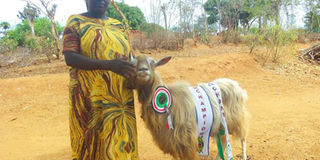Your animal too can be a show champion

Esther Syengo poses with her star Toggenberg he goat-picture goat that was declared the overall champion for the second year in a row. PHOTO | MUTHUSI
What you need to know:
- “My goat was declared the overall champion for the second year in a row,” says Syengo , who lives in Nzeluni village, Kitui County.
- Almost all the goat farmers in Nzeluni are keeping a crossbreed of the Toggenburg goat, thanks to Syengo ’s award-winning goat. The goat won for because it was clean despite its fluffy hair and was healthy.
The hairy goat bleats as its owner Esther Syengo gently holds it by the left ear.
Around the goat’s body are two straps bearing the word Champion.
Syengo is still in a celebratory mood and she is not in a hurry to remove the straps from the goat that made her proud at the just concluded Nairobi International Trade Fair.
“My goat was declared the overall champion for the second year in a row,” says Syengo , who lives in Nzeluni village, Kitui County.
The farmer is yet to come to terms with her win, having beaten dozens of other contestants from across the country.
Syengo has always wanted to be a dairy farmer but the harsh weather conditions in Kitui would not allow her to keep dairy cows.
As an alternative, she was introduced to the Toggenburg goats in 2005, together with 17 other farmers, by an extension officer working for Farm Africa, an NGO.
She then hit the ground running, starting with a goat, like others, and the buck that was given to their group known as Kitui-Mwingi Goat Breeders Association.
That buck was later sold due to old age. However, having seen the value of the animal, she bought another, which she later also sold. The one that won her an award is her third.
FLUFFY, CLEAN AND HEALTHY
“I sell the he-goats after about six to seven years,” says Syengo, noting the animal was identified by the local Ministry of Agriculture officials and taken to Nairobi by their association.
She now has 12 goats, five pure Toggenburgs and other cross-breeds.
She milks three goats getting at least five litres a day from a crossbreed and six to seven litres from the Toggenburgs. She sells the milk to residents at Sh25 a litre. The produce is not highly valued in the area as in others like Nairobi, where it goes for up to Sh100 a litre. This is the reason she is proud of her buck.
“This goat serves at least six does a day mainly the local breeds, fetching me about Sh300. I charge Sh30 for farmers who are members of our association and Sh50 for non-members,” says Syengo, who feeds the 98kg buck on nappier grass, among other feeds.
A pure Toggenburg breed, whether male or female fetches about Sh30,000. Crossbreeds go for between Sh10,000 and Sh15,000.
Toggenburg dairy goats offers up to six litres of milk every day with crossbreeds producing four to five.
“Look, this is me shaking hands with President Uhuru Kenyatta when my goat was declared the best overall at the ASK show Nairobi,” she said pointing at herself in a photo.
The goats, according to Syengo , offer her money that she uses to educate her children and cater for all her needs.
Almost all the goat farmers in Nzeluni are keeping a crossbreed of the Toggenburg goat, thanks to Syengo ’s award-winning goat. The goat won for because it was clean despite its fluffy hair and was healthy.
Dr Munuve Mutemi, the area’s livestock officer, who is also the Kitui-Mwingi Goat Breads Association official adviser, says while there are risks of diseases, a buck can serve up to 12 she-goats in a day.
“It is only age that can limit him from servicing goats. By the age of six, he will need assistance and by this time he should be sold for meat.”
He says there is need for farmers to take their animals to exhibitions so that they can gauge how they are faring on in the industry and share experiences with their peers.




